Writers are book-lovers. It’s not surprising that the plots they devise often have to do with reading, storytelling, or the creation of works of literature. Sometimes, writers just namecheck fictional titles in passing. Other times, they describe their made-up books in loving detail, or include whole chapters. These nonexistent texts expand the scope of the “real” work and disrupt its form, providing opportunities for satire, playfulness, and contradiction. Made-up books can feel just as vital as the books that enclose them. Which story is the real story?
My debut novel, Famous Men Who Never Lived, is about a refugee from an alternate universe who is trying to track down the last copy of a work of sci-fi that was never written in our world. I included excerpts from that fictional novel, The Pyronauts, because I’ve always liked the way nested narratives can talk to each other. Here are five of my favorite examples:
Misery’s Return (from Misery by Stephen King)
Paul Sheldon’s series of trashy historical novels so enthralls disgraced nurse Annie that she rescues him from a car wreck only to keep him at her house and compel him to “fix” the death of its 19th-century heroine, Misery Carmichael, nee Chastain. In the new book, composed in a haze of medical torture and opioid painkillers on a second-hand typewriter that’s missing its n key, Paul finds a surprising kind of escape—it’s the best book he’s written and he couldn’t have done it without his captor. King reproduces sections from Misery’s Return (with handwritten ns), vivid and increasingly strange. I remember reading King’s novel as a kid (I was definitely too young for it!) on a family vacation. As soon as we got home, I rushed off to the library, hoping that somehow, the Misery books were real.
Buy the Book
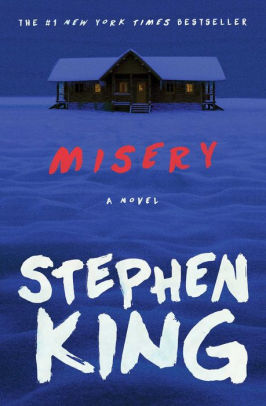

Misery
“Pale Fire” (from Pale Fire by Vladimir Nabokov)
The epic poem “Pale Fire” was the masterpiece of the late John Shade, or so we are told by Charles Kinbote, his neighbor, who has set out to edit a definitive edition. We read Shade’s four-canto poem first, uninterpreted. Then, Nabokov gives us the lines again, this time interspersed with Kinbote’s notes, which cast the poem as veiled commentary on the dramatic escape of Charles II of Zembla. But that’s kind of hard to believe, because Shade never actually mentions the European country or its deposed ruler. Could Kinbote himself be King Charles in hiding, reading his own life history into the poem? Is he a madman who invented Zembla? Or did Shade write the notes himself and make up Kinbote? No matter what we come away believing—and all of these theories sound credible to me—the frisson between poem and notes is extremely satisfying.
Buy the Book
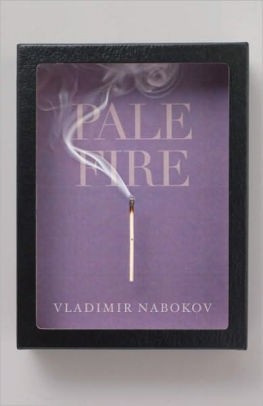

Pale Fire
Dr. Eleven (from Station Eleven by Emily St. James Mandel)
Twenty years after a flu pandemic ravaged the United States, survivor Kirsten carries around two tattered issues of a comic book called Dr. Eleven that were given to her as a child. Decades earlier, we follow their creator, administrative assistant Miranda, as she sketches the first panels, after hours at her quiet desk at a logistics company. The titular character lives on a flooded space station where it is always twilight, or nighttime; his enemies attack from fallout shelters underwater. “You don’t have to understand it,” Miranda tells her unappreciative boyfriend. “It’s mine.” Mandel’s book contains only words; she can’t show us Station Eleven. But her descriptions of the comic’s moody simplicity leave me feeling like I can see Miranda’s inner world, giving me a fuller sense of why Kirsten prizes the issues.
Buy the Book
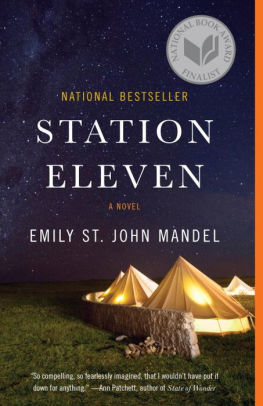

Station Eleven
The Blind Assassin story from the fictional novel The Blind Assassin (from The Blind Assassin by Margaret Atwood)
In Sakiel-Norn, a city on the planet Zyrcon, a killer-for-hire who was blinded as a child by slave labor in a carpet factory falls in love with an escaped temple virgin. This is a tale spun by a young radical in 1940s Canada to entertain his privileged girlfriend when they meet in secret. A fictional novel called The Blind Assassin alternates between the two sets of lovers and wins posthumous fame for Laura Chase. Everyone assumes she is the woman in the rendezvous, but Atwood shuffles in recollections from Laura’s now-elderly sister, Iris, which reveal a more complicated truth. The Blind Assassin received a chilly reception in Iris and Laura’s hometown, where it was denounced from the pulpit and pulled from shelves, but I had trouble keeping myself from flipping ahead to get to the next Sakiel-Norn section and the barbed banter of the star-crossed young couple.
Buy the Book
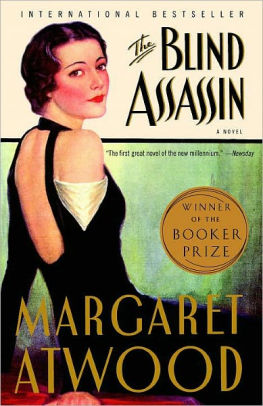

The Blind Assassin
The Osama Bin Laden: Vigilante series (from Osama by Lavie Tidhar)
Joe, a private investigator in an alternate reality, loves to read novels that detail the planning and execution of terrorist attacks—because global terrorism does not exist beyond their pages. A client who hires him to track down the series’ author sends Joe across the globe from Laos to Paris, London and New York, while shadowy operatives who want to keep the realities apart tail, assail, and finally imprison him. The Osama Bin Laden: Vigilante books are popular trade paperbacks with garish covers, released by an imprint that also publishes porn, but as Joe points out, they “read like the lab reports of a morgue, full of facts and figures all concerned with death.” The clinical excerpts Tidher includes from the books made me think about the chance casualties of these real attacks; it is Joe’s world that feels like a pulp.
Buy the Book
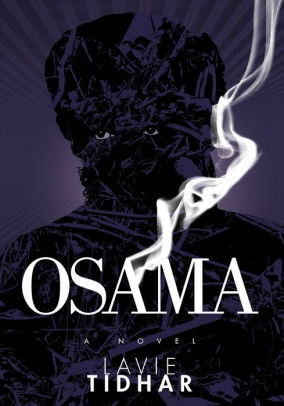

Osama
 K Chess is the author of short stories honored by the Nelson Algren Literary Award and the Pushcart Prize. She was a W. K. Rose Fellow, earned an MFA from Souther Illinois University, and currently teaches at GrubStreet. She lives with her wife in Providence, Rhode Island. Her novel Famous Men Who Never Lived is now available from Tin House Books.
K Chess is the author of short stories honored by the Nelson Algren Literary Award and the Pushcart Prize. She was a W. K. Rose Fellow, earned an MFA from Souther Illinois University, and currently teaches at GrubStreet. She lives with her wife in Providence, Rhode Island. Her novel Famous Men Who Never Lived is now available from Tin House Books.










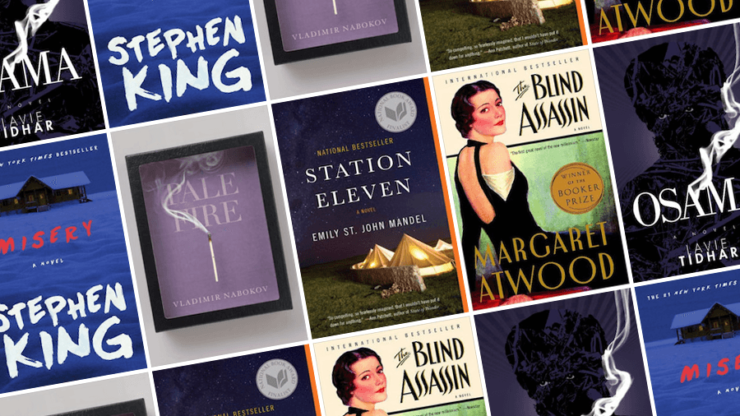
You’ve left out the granddaddies of them all: the Necronomicon and the play The King in Yellow. And, of course, The Hitchhiker’s Guide to the Galaxy.
I really liked Stephen King’s UR, if books within a Kindle book counts for this category. It’s not his best, but made me want that pink Kindle.
The Tales of Beedle the Bard in Harry Potter – at least temporarily, until it was published as a real book.
@1 Sue
Neal Stephenson’s Cryptonomicon comes to mind as well :D
“The Grasshopper Lies Heavy” which appears both in P. K. Dick’s “The Man in the High Castle” and in Charles Stross’ “Empire Games”
How does a list of this kind overlook the original S. Morgenstern novel of which William Goldman’s The Princess Bride is the Good Parts version?
And let’s not forget Where’s My Cow? by Sir Terry Pratchett. It was itself eventually released as its own book, but (IMO) that concept was spoiled by the standalone book itself referencing the act of someone reading what was theoretically the standalone book, which while being very “meta” was somewhat dissatisfying.
Hmmm. This post needs a spoiler alert.
I remember being 11, and picking up Pale Fire, straight, with no preconceptions, from the shelves of the local library. Oh the delight as a story slowly grew in the footnotes, and the breathtaking directions that story took… You could do that??? with fiction? whoa….
It was years before I appreciated some of the details, of US college life and Zemblan expats, and indeed the layered jokes of the excruciatingly mediocre poetry “I was the shadow of the waxwing, slain by the false azure of the windowpane…”
It is wonderful, and your blurb takes a little of that away…
Also not happy with the Blind Assassin summary, for the same reason.
I havent read the others, so won’t read your description — but I may well read the novels, you’ve placed them in excellent company!
The Red Book of Westmarch or, There and Back Again, in the Lord of the Rings Trilogy?
The Book of the New Sun not only contains a fictional book, it arguably is a fictional book.
De Umbrarum Regni Novem Portis from The Club Dumas by Arturo Perez-Reverte – half of it was made into the movie The Ninth Gate.
The Twelve Hours of the Night by William Ashbless from The Anubis Gates by Tim Powers.
How could you leave out The Land of Laughs by Jonathan Carroll? It’s one of the very best — one of the earliest, too, in 1980 — at evoking passionate, obsessive love for a childhood book, and what it’s like to meet someone else who loves it too.
Lisa Goldstein’s Dark Cities Underground is working in the same territory, with a main character writing a biography of a fictional children’s book author, and discovering a dangerous mystery concealed behind the book.
The Final Reflection is a book read by the Star Trek crew in the novel The Final Reflection. As a matter of fact, the framing seqence only takes up half a dozen pages of the whole book.
I can’t remember the name of it, but didn’t a book written by either Amy Pond or River Song play a part in an arc on Doctor Who during the 11th Doctor’s run?
No mention of The Way of Kings or Words of Radiance?
Both are books that contain books by those titles.
In “The Alteration” by Kingsley Amis, an alt-history novel in which the Catholic Church prevented the Protestant Reformation from taking hold, there is a novel called “The Man in the High Castle,” about a world where the Protestant Reformation did succeed.
re #16 — I’m gobsmacked that is real; on first reading I thought you were being very very snarky
(Wikipedia corrected my misapprehension).
Is it any good?
What came to mind for me was Diane Duane’s “Book of Night with Moon”.
For the Pratchett list, there’s Mr Bunny Has an Adventure: children’s picture book or foundation text of a religion for Educated Rodents?
The entire magical library at Hurtfew Abbey, in Jonathan Strange & Mr Norrell. And John Uskglass’s Book, strange as its format may be.
Also, since I am convinced that the narrator of JS & Mr. N is not Susannah Clarke but one of her fictional characters, that’s another example of “has a fictional book and is a fictional book.”
The poetry and prose of Randolph Henry Ash and Christabel LaMotte from A.S. Byatt’s Possession, all of which was so beautifully and adroitly written that I’m still vaguely surprised not to find them in the pages of my lit books from college.
The first thing coming to my mind was the book that Paul Sheldon writes and of which parts are contained in King’s novel Misery! Putting these long excerpts in the novel proper could be a really bad idea but King pulls it off brilliantly. I got so immersed in this book-within-a-book that often I wished Misery’s adventures would continue, hehe!
There’s also De Vermis Mysteriis which I’ve encountered first in another piece of Stephen King, the short story Jerusalem’s Lot. I later learned that it is actually a part of Cthulhu lore!
I first thought of The Princess Bride which has already been mentioned. There’s also S. by J.J. Abrams and Doug Dorst.
Who doesn’t love imaginary books? Fortunately, a great Wikipedia article has already cataloged a whole library’s worth of them. If you’re aware of any titles it’s missing, I’ll be impressed. Please add them!
One of the most interesting books in books is Lord of the Swastika in The Iron Dream by Norman Spinrad, written by Adolf Hitler in an alternate universe where he emigrated to the US and became a fantasy writer.
The Horn of Joy, I think it was, by Matthew in L’Engle’s A Swiftly Tilting Planet, still one of my favourite books, and favourite books-within-books, for that matter.
In Kage Baker’s The Bird of the River, Eliss treasures her memory of The Silvergilts of Delaria, a book about a family very unlike hers, that she didn’t get to finish reading.
Italo Calvino’s If On a Winter’s Night a Traveller . You are not sure if you are reading this book, or not, reader.
I’m still fond of the two books the Prince consults upon becoming King in John Barnes’ One for the Morning Glory: Highly Unpleasant Things It Is Sometimes Useful to Know and Things It Is Not Good to Know at All.
Would ‘The Book of Leaves’ count?
The Robotech novels (based on the Frankencartoon) start each chapter with a quotation from an in-universe source, often a history book or biography written by the characters (or, in one case, by someone who can refer to two of the characters as “mom” and “dad”). It does a great job of making the setting feel like an ongoing history, spanning generations and powered by tragic hindsight.
Sheri S. Tepper’s play-within-a-novel – her women’s adaptation of the Fall of Troy in The Gate To Women’s Country.
Ellen Kushner’s magnificent revenge drama (with a parrot!) in Swordspoint.
Those gloriously-dark horror novels that Sunshine reads in Robin McKinley’s Sunshine.
(23; None of these are listed in that Wikipedia article.)
How about “The Little Country”, in Charles De Lint’s book of the same name? Also unique in that it’s… unique.
@@@@@ 6, 9, 13, et al.
I think the main idea of the OP is that there is a story, within which a book plays an important role and is meaningful for one or more of the characters in, or the plot of, the main story. But there has to be a main story, in which the fictional book appears, so brief frame stories wrapping the rest of the book — as in The Princess Bride, The Final Reflection, and countless others — don’t really count.
Some more possible examples:
The First Encyclopedia of Tlön in Jorge Luis Borges’ “Tlön, Uqbar, Orbis Tertius”.
The Assassin’s Tragedy, a lost play by Christopher Marlowe, in John M. Ford’s The Scholars of Night. (I believe there is a similar “lost” Jacobean tragedy in Thomas Pynchon’s The Crying of Lot 49.)
The Island of Doctor Death and Other Stories in Gene Wolfe’s short story of the same name.
Hamster Huey and the Gooey Kablooie features in several of the Calvin and Hobbes comics.
(And, as PHalyard pointed out, there’s Italo Calvino’s If on a Winter’s Night a Traveler, which has a whole sequence of tantalizing novels that you, the Reader — and also you, the Other Reader — try in vain to finish.)
An odd example of a real — but non-existent — book playing a major role in a story might be the mysterious, much sought-after, and deadly book in Umberto Eco’s The Name of the Rose, which [SPOILERS] turns out to be the probably-real-but-definitely-lost second half of Aristotle’s Poetics, on the subject of comedy. There are no doubt thousands (millions?) of scholars who would love to get their hands on that book…
Then there’s the (partial) version of Don Quixote written by Pierre Menard in Borges’ “Pierre Mendard, Author of the Quixote“. Which in some senses you can read, as it’s word-for-word identical with Cervantes’ work, even if the meaning is very different.
The Wild Book by Juan Villoro, about a boy in search of the legendary Wild Book which has never been read before. Highly recommended.
The Forbidden Book by Jocelyn Godwin. OK, the titular forbidden book is actually the very real The Magical World of the Heroes. Nonetheless an excellent occult mystery that drops some serious arcana on the reader. Not for the faint of heart or the unlearned.
Ursula Le Guin also does that a lot. The Left Hand of Darkness contains excerpts from scientific treatises and old legends. The Dispossessed makes mention of books written by Shevek and other physicists, Bedap, Tirin, and Odo. The Telling is about a vast and forbidden body of literature.
It’s been many years that I’ve read the Illuminatus! trilogy, but I still remember Hagbard Celine’s manifesto Never Whistle While You’re Pissing.
One of my favourite examples isn’t SFF. John Irving’s novel The Water-Method Man contains a complete retelling of the Old Low Norse epic “Akthelt and Gunnel”. Old Low Norse, of course, is fictional too. (Irving has written two novels about writers, The World According to Garp and Widow for One Year, which naturally contain a lot of fictional books. But this one is my favourite.)
@@@@@ 31, Color me impressed then. Can we get a Wikipedia editor?
@36/Skallagrimsen: It doesn’t list Le Guin or Akthelt and Gunnel either, although it does list John Irving.
The Orange Catholic Bible, in Dune.
. . . and Lovecraft’s Necronomicon, which has practically gained an independent existence.
@@@@@ 15 So does Oathbringer.
Irulan’s epigraphs in Dune !!
Don’t forget Dhalgren, with both the used notebook Kid uses to write his poems and the manuscript printed in the margins of the last section of the book.
Two that immediately spring to my mind:
Encyclopedia Galactica from Isaac Asimov’s Foundation books.
The Manual of Muad Dib by the Princess Irulan from Frank Herbert’s Dune series
In both cases quotes from these fictional sources were used to open each new chapter of the books.
Surprised no one has mentioned the Fillory books in Lev Grossman’s “The Magicians” trilogu.
Oh man, the series is coming out soon, and yet no one has mentioned The Nice and Accurate Prophecies of Agnes Nutter, Witch?
And then of course there’s The Neverending Story, which is a book within a book… or is it?
#33: I am of mixed minds about whether the “framing story” device should disqualify a book from inclusion in this category; I see the issue, but I think the case-by-case evaluation would be more complex than you make it sound. (To illustrate: The Final Reflection is not the only Star Trek tie-in that uses this motif; so does Margaret Wander Bonanno’s Strangers from the Sky, save that the Bonanno invokes a time-travel plot to propel some of Our Heroes into the events of the frame. And no, that one’s not in the Wikipedia list, either.)
OTOH, whereas the film version of The Princess Bride uses the Morgenstern book as a framing device, the William Goldman book is something else again. The Princess Bride by S. Morgenstern absolutely IS a genuine fictional book, and the Goldman novel both quotes extensively from and argues with the Morgenstern novel’s agenda throughout. “Framing device” absolutely does NOT describe the relationship between the Morgenstern and Goldman texts, and I will defend that statement (to the pain!) against all challengers.
A greater complication to the catalog is the instance of a fictional book which subsequently acquires independent existence. A notable example is The Maze in the Heart of the Castle, introduced into Dorothy Gilman’s novel The Tightrope Walker, which was imaginary when that novel was published. However, Gilman subsequently wrote and published The Maze in the Heart of the Castle several years afterward (it is one of those children’s fantasy novels that gets either two stars or five on Goodreads; you either bond with it strongly or you bounce hard).
@11: The good half, fortunately. I missed the Three Musketeers references and in-jokes, but they went literally nowhere.
@32 All great examples!
Speaking of Borges, we can add the Book of Sand, a literally limitless book that is featured in his story of the same name.
I liked this piece –and I just LOVE this thread! I wish I had the time to respond to every single comment…
@47/Ashgrove: But they were vital to the misdirection of the reader.
The Two Georges, by Turtledove and Dreyfus, is an alternate history story in which the American colonies remained part of the British Empire. Because George Washington compromised with George III.
The protagonists read and discuss an alternate history story, in which the American colonies successfully rebelled against the British Empire.
@42: Not to mention that it is not clear whether the Kid really wrote the poems that were already in that notebook (did he write them and forgot?), or even the ones he’s supposed to be writing. Nevertheless, he publishes the whole thing as his.
@50: True that.
I like the movie a lot more than I liked the novel, though.
In FANGIRL by Rainbow Rowell, the protagonist writes Simon Snow fanfiction. This led to an actual Simon Snow book by Rainbow Rowell, which I haven’t read yet, but which I probably will. <G>
Also from Terry Pratchett, there is the necrotelicomnicon (or phone book of the dead).
@46, I’d call The Princess Bride a partially fictitious book. (Incidentally, I took the framing device at face value the first time I read it, at 16. I remember feeling annoyed at the “editorial” intrusions, and resolving to track down the unexpurgated version.)
One that almost immediatley lept to mind is Jules Verne’s, “Journey to the Center of the Earth.” Professor Lidenbrock (sp?) is reading a book entitled, “Heimskringla“; the chronicle of the Norwegian kings who ruled over Iceland, when he stumbles across Arne Saknusemm’s coded diary about HIS journey to the center, which he proceeds to decode and then follow. “Heimskringla” exists; Saknusemm’s diary does not. But I’ll wager it would be as interesting as the Professor’s trek.
@14 The last episode with Amy and Rory as companions (The Angels Take Manhattan) featured The Doctor reading a book by River Song which featured Rory in the past, prompting them to travel back in time to find him.
I would add The Book Thief by Markus Zusak to this amazing list. The graphic novel (of which we see some pages) which Max draws over pages of Hilter’s biography are moving, stunning, and adds another level of emotional depth to the story. This is a literal obliteration of Hitler’s hate and turning the painful and horrible situation of the character, Max, into art and beauty.
If, as @46/Bunnell proposes, a fictional novel as a framing device stretches this category, then I guess Cloud Atlas blows it up; there’s at least one story in there that exists as fiction in one of the other story-worlds.
Stephen King also references and excerpts several books written by George Stark, who was the evil altar-ego of the protagonist of The Dark Half, with a nice echo of his own Richard Bachman.
Finally Peter Straub did this at novel length; at least one of his Blue Rose trilogy was “written” by a character in another (though it’s been too long to remember exactly how that fit together).
“The Princess Bride by S. Morgenstern absolutely IS a genuine fictional book, and the Goldman novel both quotes extensively from and argues with the Morgenstern novel’s agenda throughout.”
S. Morgenstern isn’t a real person and there isn’t any other book than the one Goldman wrote. A really big clue is that S. Morgenstern is Florinese … and there is no such country as Florin. A lot of confusion comes from Goldman himself, who kept up the fiction even in letters to readers until his death.
Lord Byron’s Novel: The Evening Land by John Crowley
I would like to add the fictitious “The Hipcrime Vocabulary” by the equally fictitious “Chad Mulligan” in John Brunner’s Mcluhanesque masterpiece “Stand on Zanzibar.” Now while I can appreciate the occasional make-believe book, my personal favorite oddball literary device is when a book contains fictitious mythologies. “Stand on Zanzibar” has that too, in the stories of a mythical African tribal hero. Other books with such myth/stories are Watership Down (The rabbits’ stories of El-ahairah), and Simak’s “City,” where the entire book is, chapter by chapter, the mythical story of humans as told by dogs. There’s others that I can’t remember right now; I guess I need to peruse my copy of Encyclopedia Galactica.
And just to further confuse the category, Diane Duane’s novel, The Book of Night With Moon, shares a title but not much else with the her Young Wizards’ Book of Night With Moon, which contains the true names of everything that exists. It would probably be kinda hard to contain that on a library shelf.
ETA: and on re-skimming, I see that someone’s already named that one. So, for another novel and fictional magical book which share a title, Lloyd Alexander’s The Book of Three.
Very disappointed nobody has mentioned Octavia.
Ashmole 782 by Ashmole in Discovery of Witches by Deborah Harkness.. It’s a book of Alchemy.
A Guide for the Newly Undead in Molly Harpers Half Moon Hollow series.
The Corinna Chapman books from Kerry Greenwood refer several times to Corinna’s favorite books about Jade Forrester. The tidbits make the books sound so tempting, but there aren’t any such books.
The Hyperion Cantos epic poem written by Martin Silenus in the Hyperion Cantos book series by Dan Simmons should be on this list.
“Carry On” from Fangirl (later turned into a full published book), by Rainbow Rowell.
The unrecorded case studies that Doyle (as Watson) often mentioned in the original Sherlock Holmes stories might also qualify…if subsequent lesser writers had not presumed to write them.
I’ve always wanted to read Cantra yos’Phelium’s oft-quoted-from logbook in the Liaden series…
Rainbow Rowell’s novel Fangirl had a heroine working on a massive piece of on line fan fiction based on a series loosely resembling Harry Potter. I was intrigued by this fictional novel, “Carry On” … then RR actually wrote it … Kind of spoiled it for me, alas! I believe it has done well, though.
As a teacher librarian, I have actually been ASKED for the Necronomicon! I had to break it gently to the student that it doesn’t exist. ;
The Shadow of the Wind by Carlos Ruiz Zafon features an obsessive hunt for a fictitious book of the same name, all copies of which are being burned by a mysterious figure. There is also a strange secret library, a sort of refuge for books.
(Speaking of fictitious libraries, Richard Brautican wrote about a peculiar library for unpublished books, which was haunting enough that one of his readers eventually created a real one. This American Life did a good segment on it recently.)
Tim Powers and James Blaylock both invented works and quotes by the fictitious William Ashbless. While I’m glad to see that mentioned in this thread, they were mostly “just” used as epigraphs. I don’t recall there being a particular Ashbless work that played a key role in a Powers or Blaylock plot. It’s been a while though..
I’m enjoying the other suggestions! Except for the ones that say “I can’t BELIEVE the author didn’t choose X!” I hate those. :-)
“Venus on the Half Shell” and other fictional works by the fictitious Kilgore Trout, mentioned in the works of Kurt Vonnegut. Phillip Jose Farmer got Vonnegut to allow him to write Venus. Farmer also went ahead and wrote a sequel.
Vonnegut wasn’t happy with Venus but due to contract etc couldn’t block its publication. He did block the sequel. :(
Since both authors have been dead several years, Vonnegut in 2007, Farmer in 2009, I wonder if their estates could come to an agreement on publishing the sequel?
Only one other mention of the Fillory books in The Magicians? Tsk!
The Book of Gramarye in the Dark is Rising by Susan Cooper. What about Naomi Novik’s extremely detailed “extracts from Observations on the Order Draconia” notes at the end of the Temeraire novels?
@@@@@72/ sbursztynski – given the eventual fate of anyone who reads the Necronomicon, I hope you asked your potential readers some pointed follow-up questions. Do they want to be fish people, or deformed worm things? Driven mad by the cell secrets it contains? Do they have a death wish? Or do they wish for death upon another?
And did they ask for it in the original Arabic, or for an English translation? And did they include the authors full title (the “Mad Arab” Abdul Alhazred)? :)
@73 Matt Diamond says
The long poem The Twelve Hours of the Night by William Ashbless plays a big role in Power’s book The Anubis Gates. Powers even quotes some sections of it.
Dean Koontz’s early books often featured epigraphs from The Book of Counted Sorrows. I’m sure I was not the only librarian who had to break the news to disappointed borrowers that the book didn’t exist and the poetry was written by Koontz himself. He eventually did publish a limited edition book with this title which consisted of a long introduction about the “history” of the book and also a collection of the poetry. You can get a used copy of your very own from Amazon.com for a cool $500!
It’s not a single book but…would The Library of Babel by Gabriel García Márquez count?
“Pale Fire” is the granddaddy of them all, or at least among the books cited here (contra comment #1 :-) ), so I was very happy to see it on this list.
A. S. Byatt’s Booker Prize-winning Possession (1990) certainly deserves a place in this conversation, with its wealth of letters, poetry, and journals from a pair of 19th century Victorian poets placed side by side with its 20th century scholarly protagonists.
The Book of Hidden Things (a typed and xeroxed manuscript written by one of the characters) plays a big role in The Book of Hidden Things, by Francesco Dimitri.
It’s the first book in English by an author who’s written several fantasy books in Italian. Four friends come back on the same day each year to meet at a pizzeria in the small village in Southern Italy where they grew up. At the start of the book, they have their meeting but one doesn’t show up. When they go to his house, it looks like he has vanished mysteriously. Was it magic? Was it the Mafia? Was it something else?
Saying much more would lead to spoilers.
Jacqueline Carey’s courtesans used a pillow book called Trois Milles Joies, rather like the Kama Sutra, as a training manual during their apprenticeship.
In Newford, Charles DeLint’s fictional city, there is a bookstore that can only be accessed from dreams. It contains books never published.
The Maze in the Heart of the Castle, a fantasy novel central to the mystery The Tightrope Walker by Dorothy Gilman. I was devastated when I learned it wasn’t a real book. And then later, of course, Gilman wrote it and it was so disappointing. You pretty much set yourself up for failure trying to recreate something with such a build up.
”The Travels of Jain Farstrider” mentioned throughout the Wheel of Time.
Tim Powers and James Blaylock both invented works and quotes by the fictitious William Ashbless. While I’m glad to see that mentioned in this thread, they were mostly “just” used as epigraphs. I don’t recall there being a particular Ashbless work that played a key role in a Powers or Blaylock plot. It’s been a while though..
The only one I can remember is The Anubis Gates, in which (carefully phrasing this to avoid spoilers) Regency-Ashbless is a prominent character, and the novel is partly about how he has experiences that lead up to the writing of his epic poem “The Twelve Hours of the Night”.
I say Regency-Ashbless because there’s at least one other version, the Beat Poet William Ashbless, who may also have written “Siegel Agonistes”, quoted in Last Call.
@76, I was hoping he would ask for “Abdul ‘I Just Get These Headaches’”,actually, proving he’d read Terry Pratchett. No such luck! ;-) @75, you probably HAVE read bits of the Book Of Gramarye – at least one bit was from Tennyson and I think others were from the Mabinogion.. :-)